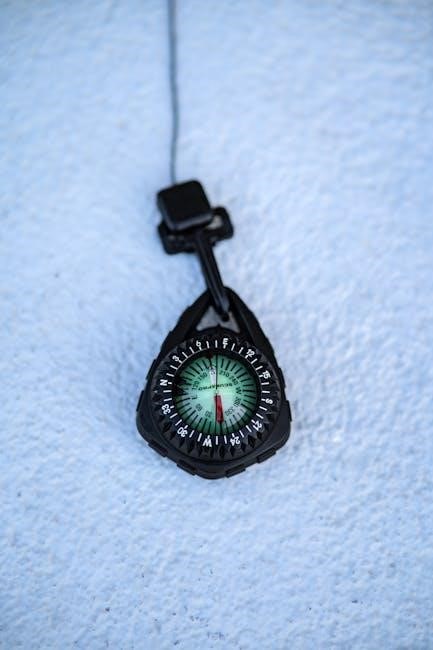The Pathfinder Cleric is a versatile divine spellcaster, serving as both healer and warrior. They channel powerful magic to support allies and protect the faithful, making them indispensable in any party.
1.1 Overview of the Cleric Class
The Cleric is a divine spellcaster who wields both martial prowess and sacred magic. They serve as a bridge between the mortal world and the divine, channeling energy to heal, protect, or smite. With access to a wide range of spells and domains, Clerics are highly adaptable, making them invaluable in both combat and non-combat scenarios.
1.2 Role in a Party
The Cleric often acts as the party’s backbone, providing divine support through healing, buffs, and protective spells. They excel at keeping allies alive and bolstering their abilities, while also capable of dealing significant damage in combat. Their versatility makes them a crucial asset, ensuring the party’s survival and success in various challenges and encounters.
1.3 Key Features and Abilities
Clerics possess strong divine spellcasting, channel energy for healing or damage, and access to powerful domains. Their high Wisdom score enhances their perceptive and spiritual abilities, while Charisma influences their divine magic. They also benefit from heavy armor proficiency and martial weapon competence, making them versatile in both offense and defense. These features solidify their role as a well-rounded divine class.
Choosing the Right Race and Background
Selecting the right race enhances a cleric’s abilities, while backgrounds provide skill proficiencies and traits that complement their divine role, creating a well-rounded character.
2.1 Races That Complement the Cleric Class
Races like humans and dwarves enhance clerics’ divine magic. Humans offer flexibility through bonus feats, while dwarves provide Wisdom boosts and resistance to magic, making them durable in combat. Other races, such as halflings and half-elves, also offer unique traits that can complement a cleric’s abilities, ensuring versatility in character builds.
2.2 Backgrounds for Optimal Cleric Builds
Backgrounds like Acolyte and Priest provide skill proficiencies and abilities that enhance clerics’ divine roles. Acolyte grants Religion and Medicine skills, while Priest offers bonuses to Diplomacy and Intimidation. These backgrounds align with the cleric’s spiritual focus, ensuring they are well-rounded in both combat and social interactions. Choose backgrounds that enhance your cleric’s intended role in the party.
Cleric Class Features
Clerics wield divine magic, channel energy for healing or harm, and select domains that grant unique abilities. Their features emphasize versatility, making them adaptable to any situation.
3.1 Channel Energy and Its Uses
Channel Energy is a core cleric ability, allowing them to heal wounds or deal damage. At higher levels, it becomes more potent, offering advanced effects like resurrecting allies or smiting enemies. Properly managing this resource is crucial for maximizing the cleric’s impact in both combat and non-combat situations. Effective use can turn the tide of any encounter.
3.2 Domains and Their Special Abilities
Domains are divine specializations that grant clerics unique spells and abilities. Each domain reflects a specific aspect of their deity’s power, such as Life for healing, Trickery for deception, or War for combat prowess. Choosing the right domain aligns with the cleric’s role and playstyle, enhancing their effectiveness in both combat and non-combat scenarios. Proper domain selection is key to optimizing a cleric build.
3.3 Other Key Class Features
Beyond domains, clerics gain access to powerful features like high-level spellcasting, improved healing, and enhanced divine interventions. They also benefit from abilities like Aid, Death Ward, and Sending, which provide versatile support in both combat and non-combat scenarios. These features make clerics highly adaptable, capable of fulfilling multiple roles within a party, from healer to battlefield commander.
Selecting the Right Deity
Choosing a deity aligns your cleric with specific alignments and domains, granting unique abilities and shaping their role in the world. This decision influences their spells, abilities, and ethics.
4.1 Alignments and Their Implications
A cleric’s alignment determines their moral and ethical compass, influencing their abilities and spell access. Lawful clerics value order, while chaotic ones embrace freedom. Good-aligned clerics focus on healing and protection, whereas evil clerics often wield cursing and destruction. Neutral alignments balance these extremes, offering versatility. Each alignment shapes the cleric’s role, making it a crucial choice for their identity and playstyle.
4.2 Deity-Specific Benefits and Restrictions
Choosing a deity grants clerics unique boons tied to their worship. For example, a war deity might offer combat enhancements, while a healing deity could provide restorative powers. However, this also means adhering to restrictions, such as forbidden weapons or actions. These divine mandates shape the cleric’s abilities and role, ensuring their powers align with their faith.
Ability scores are crucial for clerics, as they determine spellcasting and combat effectiveness. High Wisdom enhances divine magic, while Strength improves melee capabilities. Proper allocation ensures balanced power and utility. For clerics, Wisdom is paramount, as it governs spellcasting and access to higher-level spells. Strength or Dexterity should be next, depending on combat style. Constitution enhances survivability, while Charisma aids in social interactions. A balanced approach ensures effectiveness in both magic and physical roles; Proper allocation maximizes versatility and durability in various scenarios. Allocate highest points to Wisdom for strong spellcasting. Assign next points to Constitution for increased health and durability. Strength or Dexterity should follow, based on preferred combat style. Charisma can be moderate for social skills. Finally, assign remaining points to Intelligence or Dexterity for situational benefits. This balanced approach ensures a well-rounded cleric capable of handling multiple roles effectively in any party. Feats enhance a cleric’s abilities, offering combat, spellcasting, and utility improvements. Key choices include Warrior Priest for martial prowess and Spell Penetration for overcoming resistances, maximizing effectiveness. Essential feats for clerics include Warrior Priest, which boosts weapon proficiency, and Spell Penetration, enhancing magical effectiveness. Extend Spell increases duration, while Quicken Spell allows casting in tight spots. These feats ensure versatility, whether focusing on combat, support, or spellcasting efficiency, making them cornerstone choices for any cleric build. Optional feats like Weapon Focus enhance melee prowess, while Selective Channeling allows precise healing. Spellsong combines performance with casting, and Extra Channel boosts energy uses. These feats let clerics specialize in combat, support, or unique playstyles, offering flexibility for tailored builds without compromising core abilities. Cleric spells offer versatile healing, protection, and combat support. From Aid to Death Ward, these spells enhance survivability and provide crucial battlefield advantages, making clerics indispensable allies. Clerics are divine spellcasters, channeling powerful magic to heal, protect, and smite. Their spells range from minor blessings to high-level miracles, offering flexibility in combat and support. Clerics prepare spells daily, drawing from a broad spell list, and can specialize through domains. Their spellcasting is fueled by wisdom, making it essential to prioritize this ability for optimal performance. Clerics gain access to spells that vary in utility and power at each level. Low-level spells like Cure Wounds and Bless provide immediate benefits, while mid-level spells like Aid and Death Ward offer sustained support. High-level spells such as Resurrection and Summon Celestial Ally are game-changing, making strategic spell selection crucial for effectiveness in various scenarios and challenges.
Effective spell preparation is vital for clerics, balancing offense, defense, and utility. Prioritize spells like Aid and Death Ward for long-term support, while reserving higher-level slots for critical moments. Consider the party’s needs and anticipated challenges, ensuring a mix of healing, buffs, and damage-dealing spells. Flexibility is key, as adapting to unexpected situations can make or break a campaign. Clerics rely on sacred armor, shields, and weapons, often enhanced with magical properties to boost their abilities. Selecting the right gear ensures optimal performance in combat and divine tasks. Clerics often wield maces or warhammers for melee combat, as these align with their divine focus. Heavy armor is ideal, offering superior protection without hindering spellcasting. Sacred weapons and magic armor enhance their effectiveness, ensuring they can both heal and fight effectively. Choosing the right equipment balances defense and offensive capabilities, making Clerics versatile in battle and beyond. Magical items like holy symbols and staves amplify a Cleric’s divine magic, enhancing spellcasting and channeling. Amulets of Mighty Fists and blessed armor boost physical prowess, while cloaks of resistance provide elemental protection. Wands and scrolls offer versatility, allowing Clerics to conserve spell slots. These items ensure Clerics remain effective healers, supporters, and combatants in any scenario. Clerics excel in combat as both healers and damage dealers, using spells like spiritual weapon and channel energy to protect allies and smite enemies effectively in battles. Clerics shine in combat by balancing healing and damage. Use Aid and Bless to bolster allies, while employing spiritual weapon and channel energy to harm foes. Optimize positioning to protect the party and debuff enemies with Hold Person or Entangler. Manage resources wisely, conserving spells for critical moments. Adapt strategies based on enemy weaknesses and your party’s needs, ensuring maximum impact in every encounter. Clerics must carefully manage their channel energy uses and spell slots to sustain both offense and defense. Prioritize Aid and Death Ward for critical ally support, while conserving higher-level spells for decisive moments. Ration channel energy to avoid depletion, ensuring consistent healing and damage output throughout prolonged fights. Adapt resource allocation based on battle intensity and party needs to maintain effectiveness. Clerics excel beyond combat with spells like Aid, Bless, and Lesser Restoration, enhancing ally capabilities and resolving conditions, making them vital for exploration and skill challenges. Clerics can use their divine magic for healing, blessings, and support outside of battles. Spells like Aid, Death Ward, and Sending provide long-lasting benefits, enhance abilities, and facilitate communication. These abilities make clerics invaluable for resolving conflicts, aiding allies, and overcoming challenges during exploration and role-playing scenarios. Their versatility ensures they remain essential in all aspects of the game. Clerics excel at bolstering their companions through divine interventions. Spells like Aid and Bless enhance allies’ capabilities, while Remove Fear and Restoration alleviate mental and physical afflictions. Their ability to provide moral support and healing ensures allies remain resilient and prepared for challenges, making the cleric a cornerstone of any adventuring party’s success and cohesion. Clerics can seamlessly integrate with other classes like Alchemist or Wizard, enhancing their divine magic with arcane or alchemical prowess. This versatility allows for unique, powerful builds. Clerics often multi-class with Alchemists for enhanced survivability and spellcasting flexibility. A Cleric 1/Alchemist dip grants access to Disciple of Life, boosting healing and support capabilities, while maintaining divine magic. This combination is particularly effective for characters focused on support roles or healer-tanks, blending the Cleric’s divine might with the Alchemist’s versatility. Multi-classing as a Cleric offers versatility and enhanced abilities, such as combining divine magic with martial prowess or alchemical expertise. However, it can dilute class identity and complicate builds. While it unlocks powerful synergies, like the Cleric/Alchemist combo for boosted healing, improper balancing may lead to weaknesses in core abilities. Careful planning is essential to avoid compromising the Cleric’s primary strengths. At higher levels, Clerics excel by optimizing spell selection, managing resources efficiently, and employing advanced divine strategies, making them formidable supports and combatants in complex encounters. At higher levels, Clerics should focus on enhancing spellcasting and survivability. Investing in Wisdom boosts spell effectiveness, while selecting high-level spells like Heal or Resurrection ensures maximum impact. Additionally, equipping magical items that improve caster level or grant resistance can significantly enhance a Cleric’s battlefield presence. Balancing offensive and defensive capabilities ensures versatility in challenging encounters. Veteran players can refine their Cleric play by mastering spell timing and resource management. Prioritizing high-level spells like Heal and Resurrection ensures critical moments are handled effectively. Leveraging domain abilities and magical items to enhance caster level or resistance further amplifies impact. Preparing for specific encounter types and optimizing spell slots usage are key to maintaining versatility and dominance in high-level scenarios.
Ability Scores and Their Importance
5.1 Prioritizing Ability Scores for Clerics
5.2 How to Allocate Ability Score Points

Feats for Clerics
6.1 Essential Feats for Cleric Builds
6.2 Optional Feats for Specialization

Cleric Spells and Their Uses
7;1 Overview of Cleric Spellcasting
7.2 Most Useful Spells for Different Levels
7.3 Strategies for Spell Preparation
Equipment and Magical Items
8.1 Weapon and Armor Choices
8.2 Magical Items That Enhance Cleric Abilities
Combat Strategies for Clerics
9.1 Effective Tactics in Combat
9.2 Managing Resources in Combat
Out-of-Combat Utility
10.1 Non-Combat Uses of Cleric Abilities
10.2 Supporting Allies Outside of Combat

Multi-Classing Options
11.1 Popular Multi-Class Combinations
11.2 Pros and Cons of Multi-Classing
Advanced Tactics and High-Level Play
12.1 Optimizing Cleric Builds at Higher Levels
12.2 Advanced Strategies for Veteran Players
